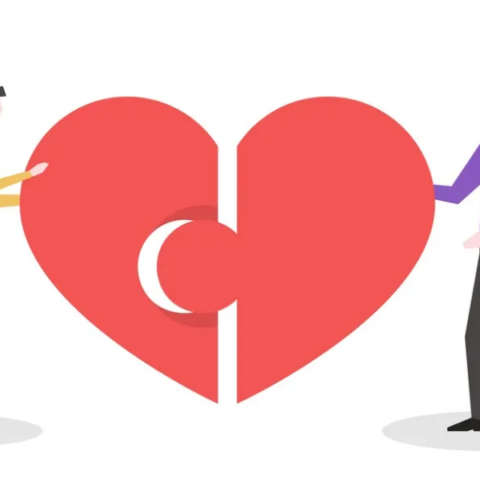Blog Post By Arin Wallington
Are Your Automatic Thoughts Ruining Relationships? How You Can Stop It

Shifting Shame & Blame to Problems & Solutions
We have all heard of the blame game. You know, the one where no one wins and everyday moments have the potential to cause major stress in a family.
Let’s say mom forgot to pick up groceries on the way home. There isn’t food for dad to cook dinner as he planned. Angrily he says “Why didn’t you pick up the groceries like I asked!? Now we have nothing to eat!” She quickly responds, “If you had texted me the list like I asked, maybe I wouldn’t have forgotten, and why is this always my issue? You are welcome to pick up the groceries anytime you like, I am sick of it anyways.”
And, like many couples after an argument, we seek solace. This might include a stiff drink, zoning out on electronics or retail therapy. Without actively knowing it, we are trying to self-soothe unpleasant feelings with distractions, after just riding an emotional roller coaster of (1) nervous system activation (2) fighting off “the threat” and (3) trying to calm and soothe afterwards. Most likely, this couple will continue the roller coaster ride until they can do some deep self-healing.
In this case, when hunger collides with stressed and activated nervous systems, physiological changes occur – heart beats accelerate, pulse quickens and adrenaline is released. Our bodies are preparing for an argument, and we are quicker to respond without thinking. Sadly, before even uttering a word, the nervous system has already created a no-win situation.
Dad starts to assume things about the forgotten groceries that are prompted by negative ways he feels about himself that he was taught growing up, called negative cognitions. Dad’s negative cognitions are in parentheses:
- She forgot the groceries on purpose (I’m unloveable).
- She was too lazy to remember (we aren’t important enough to consider).
- She acts like she doesn’t care (I am not a priority).
In this interaction, mom feels blamed and is triggered by his words, operating from the negative cognitions she was taught to feel about herself as a little girl. She hears:
- You are lazy.
- You never think about anyone but yourself.
- You are so selfish.
She feels shame for her for the grocery mixup. Based on her family dynamics, she enters attack mode and begins to staunchly defend herself. It becomes a battle of who is to blame, trying to shift personal feelings of shame to someone, anyone else. Each person is trying to prove, “it’s not my fault!” Now it’s bigger than groceries, it’s about feeling worthy and justified. Many arguments look like this, as we aren’t taught as a society to be aware of the wounds we bring from childhood into our present lives.
Operating from childhood hurt, shame and blame become the primary weapons used to try and get needs met during disagreements. Unfortunately these tools never work well to actually solve an issue and tend to get people dug deeper into negative emotions.
As stress rises (no food!), many of us operate on inherited automatic responses from previous generations. Because getting needs met appropriately was not experienced or learned (our parents had parents also operating from wounded nervous systems and dysfunctional family dynamics), what comes next is a war that looks like it was waged by angry eight year olds.
Does it always have to look like this in families? The answer is no!
Emotionally mature/ healthy parents were most likely raised by parents who were more calm, less stressed, and better able to self soothe and teach these tools to their children. They are more able to see problems as just that, problems, not personal attacks.
An emotionally healthy dad sees an issue of no food in the house; just like many of us would, he feels irritation rise up in his body, but:
- He is able to pause this feeling before acting.
- He needs information first, he knows he needs to ask some questions.
- He takes a deep breath to calm himself before communicating with his wife about his hurt feelings.
The emotionally mature mom notices anger aimed at her and in these moments before reacting she can also breathe, slow down, and notice these internal feelings for herself. She knows she does not have to take this personally- This does not mean anything about her, this is simply an error. This mom apologizes and takes responsibility.
This family is finding solutions to the problems without negative thoughts taking over. Despite being irritated or feeling some blame, they find a solution that works for all – let’s order pizza!
Getting off this roller coaster can start with identifying the negative cognitions you might have been taught about yourself growing up. I have linked the EMDR negative/positive cognitions list [LINK TO LIST] I use in my practice. Do any of these thoughts feel like they might bring up emotions for you?
Negative thoughts about ourselves can cause us to see a world already discolored by predominating ideas that we don’t even know are there. If we already feel like we aren’t good enough, we can be more likely to find confirmations of these beliefs in communications with friends and loved ones – this is referred to as confirmation bias. Becoming aware of our thoughts helps us stop this automatic response. The more times we interrupt this pattern, the more our brains can relearn how to cope with stress in a more positive and healthy way.
We don’t have to fight like our parents. There can be pizza for everyone, if we are willing to do the internal work of self-awareness and self-healing.
Be well,

*Content from Francine Shapiro’s book “Eye Movement Desensitization and Reprocessing (EMDR) Therapy, Third Edition: Basic Principles, Protocols, and Procedures.”

